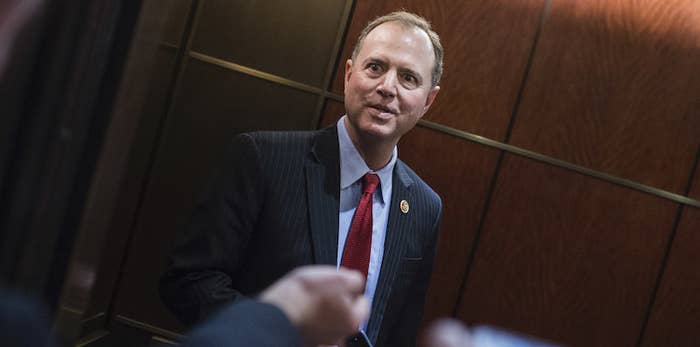
WASHINGTON — House Democrats are working on new legislation to force the Trump administration to release secret findings on the full extent of Saudi Arabia’s role in the brutal killing of Washington Post columnist Jamal Khashoggi.
A massive defense spending bill that became law in December ordered the country’s top intelligence official to send Congress an unclassified report identifying those responsible for Khashoggi’s death at a Saudi consulate in 2018. But that official, the director of national intelligence, failed to do so by the required mid-January deadline, prompting complaints from lawmakers.
In February, the Office of the Director of National Intelligence responded by sending Congress a letter saying the office couldn’t provide any unclassified information about Khashoggi’s death, as well as a classified annex with intelligence officials’ findings. Though part of the defense bill allowed for such an annex, lawmakers have said the ODNI hasn’t met the conditions set out in the law. Declassifying the annex, while making some necessary redactions, would fulfill ODNI’s obligations without harming national security, House Intelligence Committee Chair Adam Schiff told the office.
Press reports citing unnamed US officials have revealed that the CIA concluded that Saudi Crown Prince Mohammed bin Salman ordered Khashoggi’s killing at the consulate in Istanbul, Turkey. But the crown prince has denied that he was involved, and President Donald Trump has given him the benefit of the doubt. Khashoggi, a critic of the Saudi regime, was reportedly tortured, killed, and dismembered with a bone saw by a squad of more than a dozen men. If released, the ODNI annex could provide the administration’s first public acknowledgment of the breadth of the Saudi government’s role in Khashoggi’s death.
“I can’t talk about the content,” New Jersey Rep. Tom Malinowski, a member of the House Foreign Affairs Committee, said this week. “But I can tell you that it is a thorough accounting of responsibility for the murder of Jamal Khashoggi and exactly the sort of thing that should be before the public so that we can have an informed debate about our relationship with Saudi Arabia.”
But Congress has yet to receive the declassified annex. Now, Schiff and his team are escalating their efforts, looking at measures to further compel ODNI to declassify the document, which would allow Congress to make it public.
“There can be no accountability for the brutal murder of Jamal Khashoggi until the Administration makes public what the U.S. government knows regarding who in the Saudi government ordered, carried out, and attempted to cover-up the killing,” Schiff said in a statement to BuzzFeed News. “Since ODNI has failed to comply with [the law], Congress will need to take further legislative and budgetary steps to ensure declassification of a report the Intelligence Community provided to Congress earlier this year.”
Those legislative steps, according to a committee official, would be comparable to a yearslong effort in Congress to pressure the Obama administration to declassify a different secret document about Saudi Arabia that had been hidden from the public on national security grounds: the so-called 28 pages from Congress’s 9/11 report that alleged links between the Saudi government and those who perpetrated the terrorist attacks. The pages were declassified by the administration and subsequently released by the House Intelligence Committee in July 2016 following a bipartisan public pressure campaign that involved a series of bills and resolutions.
“The Committee is considering a similar legislative approach to require declassification of a classified report on Khashoggi’s murder that ODNI provided to Congress in February 2020,” the committee official said, speaking on background. “The legislation under consideration would require ODNI to declassify the report it provided to Congress in February 2020, consistent with provisions of the 2019 NDAA and [the Intelligence Authorization Act] that required ODNI to submit an unclassified report.”
But ODNI “believes its response satisfies Congress’s specific requests,” a spokesperson for the office said; the provisions in the defense bill allowed for a classified annex and a report that protected the sensitive sources and methods used by the intelligence community. “The IC has consistently provided our oversight committees with all relevant intelligence,” wrote Matt Lahr, deputy assistant DNI for strategic communications. “This particular request asks us to make that intelligence available to the public. That is something that cannot be done without jeopardizing sources and methods.”
In February, ODNI told lawmakers the same thing: hat it could not provide any unclassified information about Khashoggi’s death due to concerns about revealing sources and methods. The letter, provided to BuzzFeed News by the office of Oregon Sen. Ron Wyden — who authored one of the provisions calling for an unclassified report on Khashoggi’s killing — was just over one page long and accompanied the classified annex.

Lawmakers like Schiff and Malinowski disagree with ODNI’s claim that it has satisfied its obligations under the law, as it called for an unclassified report. They also argue that the annex could be declassified without harming sources and methods.
“The Committee shares ODNI's concerns regarding the protection of sensitive Intelligence Community sources and methods,” Schiff wrote in a letter to acting DNI Richard Grenell — a staunch ally of the president — in February. “However, after reviewing the classified annex, the Committee believes that the annex could be declassified with appropriate redactions that should not alter or obscure in any way the Intelligence Community's determinations, presentation of evidence, or identification of relevant persons, as required by law.”
“Failure to declassify the annex and produce an unclassified report could give rise to concerns that ODNI is using the classification process impermissibly in order to shield information of intense public interest from public release,” Schiff wrote.
Other lawmakers have also urged Grenell to reconsider. In March, the top Republican and Democrat on the Senate Intelligence Committee wrote to Grenell calling on him to declassify the annex.
Wyden, a longtime Democratic member of that committee who was involved in the 28 pages effort, wants to go a step further now by triggering a rarely used mechanism that allows the Senate to release classified information. The committee — and possibly the whole Senate — would need to agree, in a bipartisan manner, that revealing the information would be in the public interest. However, senators have been away from the Capitol due to the coronavirus outbreak, delaying the start of that process. They are scheduled to return on Monday.
Malinowski, a former senior official at the State Department and National Security Council, is pursuing a different route. He said he has spoken with the State Department about enforcing an existing law banning foreign officials who have committed human rights abuses from entering the country. Malinowski wants any Saudi officials connected to Khashoggi’s death to be barred from obtaining a US visa, but said he’s yet to receive a response from the department.
The State Department declined to comment.
Malinowski said he would “certainly support” new legislation from Schiff, adding that he spoke to the California Democrat and his staff after they received the classified annex in February. “We’ve encouraged them to pursue this,” Malinowski said. But Malinowski, who would prefer binding legislation, noted the difficulty in passing bills during the current pandemic. (The House currently has no plans to return to Washington, but has created a bipartisan committee to take a look at the possibility of remote voting.)
Kentucky Rep. Thomas Massie, a Republican who was a vocal proponent of releasing the 28 pages, didn’t say whether he would support legislation from Schiff related to Khashoggi’s death. But Massie, who cosponsored a resolution in early 2015 urging the Obama administration to declassify the 28 pages, expressed support for the budgetary measures Schiff cited. Each year, the intelligence committees are responsible for authorizing funding for the country’s spy agencies.
“The most powerful tool Congress has to enforce its authority is the power of the purse,” Massie said. “If the DNI isn’t in compliance, we should cut their funding. Anything less is a pretend fight.”
Any new legislation would need bipartisan support to ultimately reach the president’s desk — or apply enough public pressure to the administration for it to reconsider — as Republicans control the Senate. It’s unclear how many Republicans might support a new bill calling on ODNI to release the Khashoggi report, but the 28 pages effort received broad backing, and several GOP senators have split from the administration on the Khashoggi matter.
In December 2018, two months after Khashoggi’s death, senators received a private briefing from the CIA on his killing, and several members left blaming Crown Prince Mohammed. Then, the chamber voted unanimously to condemn his role in the scheme. Senators, including seven Republicans, also voted to end US support for the Saudi-led war in Yemen.
“MBS, the crown prince, is a wrecking ball,” Sen. Lindsey Graham said that month. “I think he’s complicit in the murder of Mr. Khashoggi to the highest level possible."
UPDATE
This story has been updated with the State Department's response.

